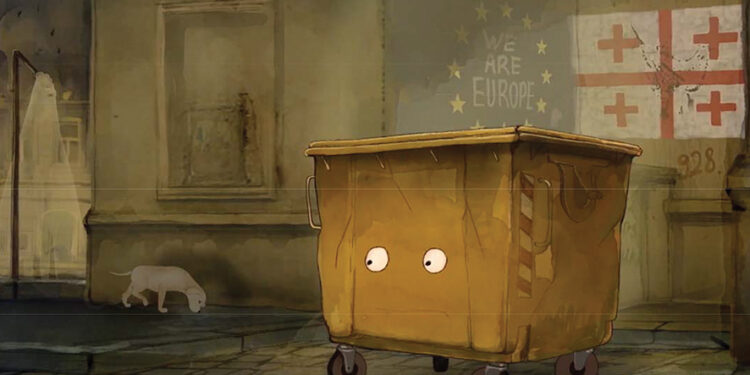The animated short film ‘Saturday Cleaning’ has recently been released on YouTube, capturing the attention of audiences with its poignant portrayal of the protests in Tbilisi. The narrative centers around a humble garbage bin, which initially awaits the arrival of an orange garbage truck. As events unfold, the bin becomes instrumental in the construction of barricades and is eventually set ablaze. In a transformative sequence, the bin morphs into numerous dancing pawns adorned with the Georgian flag. This film is dedicated to political prisoners, offering a profound commentary on societal struggles and the symbolism embedded within everyday objects.
Mukhram Makharadze, the creative force behind ‘Saturday Cleaning,’ is a Georgian production designer and art department professional known for his work in films such as ‘He Said Mommy’ (2017), and ‘My Happy Family’ (2017). His expertise in visual storytelling and design is evident in ‘Saturday Cleaning,’ where he employs minimalist yet evocative imagery to convey complex sociopolitical themes.
The Garbage Bin: From Mundanity to Symbolism
In Saturday Cleaning, the garbage bin transcends its everyday function, evolving into a symbol of resistance and transformation. This metamorphosis reflects the reclamation of agency by individuals, turning an object associated with waste into a tool of defiance. Historically, mundane objects have been repurposed during protests to convey powerful messages. For instance, during the 2013 protests in Kyiv, demonstrators used garbage containers to construct barricades, symbolizing a stand against authority. Similarly, in the 2023 Paris demonstrations against pension reforms, protesters utilized trash bins to build barricades near the Constitutional Council, illustrating the garbage bin’s role as a symbol of public dissent.
The film’s depiction of the garbage bin transforming into dancing pawns bearing the Georgian flag invites a deeper philosophical interpretation. In chess, pawns are often viewed as the least powerful pieces, yet they hold the potential to change the game’s outcome. This metamorphosis symbolizes the empowerment of ordinary citizens, suggesting that collective action can lead to significant societal transformations.
Philosopher Michel Foucault’s concept of “biopower” explores how states exert control over citizens’ bodies and lives. The film subverts this notion by illustrating how individuals reclaim agency, using their bodies and available resources to challenge authority. The garbage bin, an object of control and order, becomes a vessel for expressing dissent and disrupting the status quo.
The Role of Everyday Objects in Social Movements
The appropriation of everyday objects in protests serves to bridge the gap between the mundane and the political. Sociologist Pierre Bourdieu’s theory of habitus suggests that individuals’ perceptions and actions are shaped by their environment and experiences. By repurposing common items like garbage bins, protesters challenge societal norms and redefine the meanings associated with these objects.
This act of transformation also speaks to the concept of “bricolage,” introduced by anthropologist Claude Lévi-Strauss, which involves creating new structures from available materials. In the context of protests, bricolage becomes a form of resistance, where participants use what is at hand to construct symbols and tools that convey their messages.
Anthropologically, protests can be viewed as rituals that enact social dramas, challenging existing power structures and proposing new social orders. The burning of the garbage bin in the film can be interpreted as a rite of passage, symbolizing the destruction of the old to make way for the new. The subsequent emergence of dancing pawns represents a rebirth, highlighting the potential for renewal and change inherent in collective action.
Victor Turner’s concept of “communitas” describes the sense of unity that emerges during collective rituals. The film encapsulates this feeling, portraying how individuals come together, transcending their individual identities to form a cohesive movement aimed at challenging and transforming societal structures.
Saturday Cleaning offers a rich tapestry of symbolism, drawing from history, philosophy, sociology, and anthropology to present a nuanced commentary on protest and transformation. The garbage bin, an object of everyday life, becomes a symbol of resistance and change, reflecting the capacity of individuals to redefine their realities and challenge existing power structures. The film serves as a poignant reminder of the potential for ordinary objects and ordinary people to effect extraordinary change.
By Ivan Nechaev














